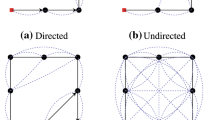Abstract
In conflict-free routing a set of agents have to traverse a common infrastructure without interfering with each other. Maza and Castagna [1] showed how the route plans of such agents can be repaired by maintaining the priority of agents on infrastructure resources. They also developed an algorithm that allows agents to change priorities to avoid long waits. We extend the work of Maza and Castagna by (i) specifying an algorithm that allows more priority changes, and by (ii) defining a graph structure that can predict exactly which priority changes will lead to a deadlock, and which will not.
Preview
Unable to display preview. Download preview PDF.
Similar content being viewed by others
References
Maza, S., Castagna, P.: A performance-based structural policy for conflict-free routing of bi-directional automated guided vehicles. Computers in Industry 56(7), 719–733 (2005)
Fujii, S., Sandoh, H., Hozaki, R.: A routing control method of automated guided vehicles by the shortest path with time-windows. In: Production Research: Approaching the 21st Century, pp. 489–495 (1989)
Kim, C.W., Tanchoco, J.: Conflict-free shortest-time bidirectional AGV routeing. International Journal of Production Research 29(1), 2377–2391 (1991)
Hatzack, W., Nebel, B.: The operational traffic problem: Computational complexity and solutions. In: Cesta, A. (ed.) Proceedings of the 6th European Conference on Planning (ECP 2001), pp. 49–60 (2001)
ter Mors, A.W., Zutt, J., Witteveen, C.: Context-aware logistic routing and scheduling. In: Proceedings of the Seventeenth International Conference on Automated Planning and Scheduling, pp. 328–335 (2007)
Lehmann, M., Grunow, M., Günther, H.O.: Deadlock handling for real-time control of AGVs at automated container terminals. OR Spectrum 28(4), 631–657 (2006)
Wu, N., Zhou, M.: Resource-oriented petri nets in deadlock avoidance of AGV systems. In: Proceedings of the 2001 IEEE International Conference on Robotics and Automation (ICRA), Seoul, Korea, May 2001, pp. 64–69 (2001)
Reveliotis, S.A.: Conflict resolution in AGV systems. IIE Transactions 32(7), 647–659 (2000)
Maza, S., Castagna, P.: Conflict-free AGV routing in bi-directional network. In: Proceedings of the 8th IEEE International Conference on Emerging Technologies and Factory Automation, Antibes-Juan les Pins, France, October 2001, vol. 2, pp. 761–764 (2001)
Author information
Authors and Affiliations
Editor information
Editors and Affiliations
Rights and permissions
Copyright information
© 2009 Springer-Verlag Berlin Heidelberg
About this paper
Cite this paper
ter Mors, A., Witteveen, C. (2009). Plan Repair in Conflict-Free Routing. In: Chien, BC., Hong, TP., Chen, SM., Ali, M. (eds) Next-Generation Applied Intelligence. IEA/AIE 2009. Lecture Notes in Computer Science(), vol 5579. Springer, Berlin, Heidelberg. https://doi.org/10.1007/978-3-642-02568-6_5
Download citation
DOI: https://doi.org/10.1007/978-3-642-02568-6_5
Publisher Name: Springer, Berlin, Heidelberg
Print ISBN: 978-3-642-02567-9
Online ISBN: 978-3-642-02568-6
eBook Packages: Computer ScienceComputer Science (R0)




